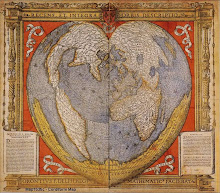Sunday, August 17, 2008
When Our Reason Fails Us
As we have seen with our other 17th century readings, many scientists and writers in this time period believed that truth could be attained through the use of reason. Galileo and Kepler use scientific reason in an attempt to better understand the universe. We see with Galileo's rhetoric, however, that the purpose for such reasoning is to assist humans in their pursuit to comprehend the divine. For instance, Galileo's telescope brings him nearly divine eyesight. Reason is important in Paradise Lost as well. Raphael reminds Adam that humans have free will and can choose whether or not they should obey God. Raphael tells Adam that humans can only understand God, heaven and divinity through obedience. Later, Adam states, "to know / That which before is lies in daily life / Is the prime wisdom," implying that the key to internal happiness lies within man and the terrestrial world he inhabits. One does not need to look to the cosmos for satisfaction. But human reason is complicated, and at times, prohibits human from understanding the world intuitively. Additionally, human reason is flawed--the process of reasoning itself is untainted but the information one is processing can be false. Therefore, Eve's desire to understand the divine (and perhaps become divine herself) combined with her reasoning of Satan's lies lead her to initiate the Fall. Perhaps in a postlapsarian world we cannot know God through intuition. The possibility escapes us. Instead the very process that secured our mortality is reactivated in the hopes that we can better comprehend the universe.
Subscribe to:
Post Comments (Atom)

No comments:
Post a Comment